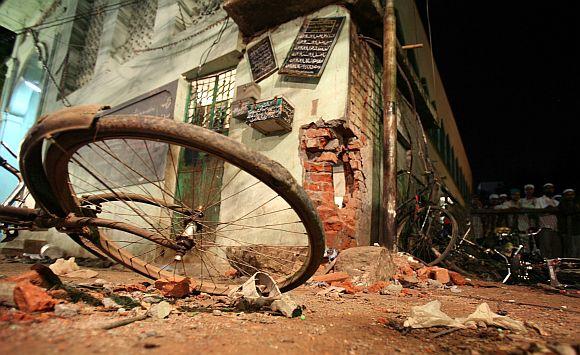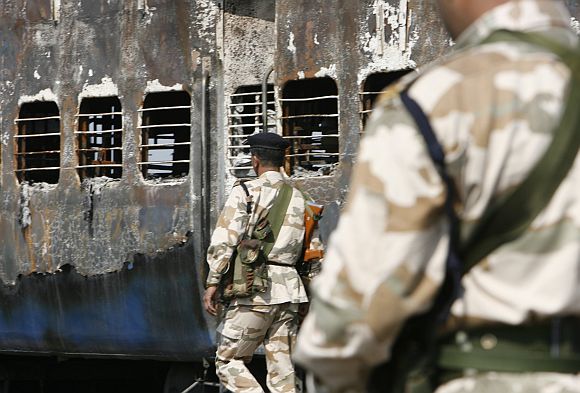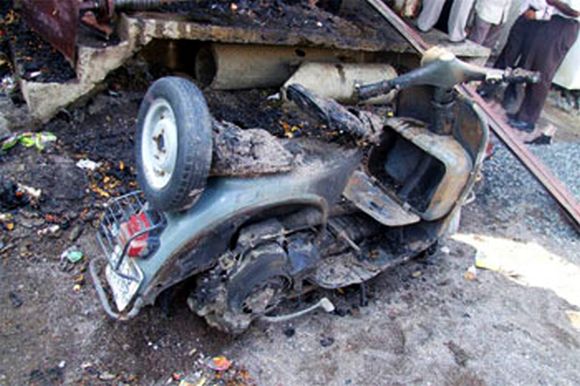 | « Back to article | Print this article |
Why NIA has FAILED to crack the blast cases
In what can be only be called an utter embarrassment for the National Investigating Agency, two accused in the Malegaon and Mecca Masjid blasts were granted bail by the courts in a span of five days, due to failure on the agency's part to file a chargesheet in the stipulated period of 90 days, as mandated by the Code of Criminal Procedure. Vicky Nanjappa analyses the failure
The release of two accused just a few days apart, indicates that in both these cases the NIA has not managed to put up a strong-enough case for the courts to take cognisance.
The first question that comes to mind is whether the investigating agency has enough proof against the accused, who were rounded up by the dozen. However, while speaking to scores of officials in Hyderabad, Madhya Pradesh and Rajasthan, it becomes very clear that it is an ugly ego battle between the local police and the NIA which is hurting the cases bad.
Many legal experts and police officials who have been following these cases closely (2006-Malegaon, 2007-Mecca Masjid, Ajmer and Samjhauta Express) are of the view that the times for the NIA are tough, and many more accused could get bail because the chargesheet was not filed in the mandatory period.
The bails
On June 1, a Hyderabad court granted bail to Bharath Ratheshwar, an accused in the Mecca Masjid blasts, on the grounds that the NIA had failed to file a chargesheet even after being granted 180 days to do so.
This despite the CrPC making it clear that a chargesheet should be filed in 90 days after the arrest, failing which the accused is entitled for bail unless the investigating agency is able to give sufficient reason for the delay.
On Tuesday, Lokesh Sharma, another accused in the 2007 Malegaon blasts secured bail on similar grounds.
And these are not stray cases. Earlier, the court had granted bail to three other accused in the Malegaon blasts -- Sham Sahu, Shiv Narayan Kalsanghra and Ajay Rahirkar.
While granting bail to these accused persons, Justice AM Thipsay of the Bombay high court had virtually held that there was no evidence against them. They were granted bail after spending three years in jail.
Click NEXT to read further...
'Utter lack of cooperation'
While the NIA says that these are complex cases and need a lot of time for investigation, many others feel that the evidence is not coming by because the investigation/re-investigation started off as a witch-hunt for political reasons.
NIA sources blame the current situation on the lack of cooperation from local cops, who form the backbone of any investigation.
"Moreover, these cases were investigated in a particular direction for many years -- we got the job to undo the mess, and that has only made the job much harder. The basic evidence is procured by any investigating agency from the scene of the crime. The accused were walking free for nearly four years before we could take over the probe, and during this period a lot of evidence went missing," says a source.
The local cops, who were initially handling these cases say that the NIA has been pretty arrogant while handling these cases.
Click NEXT to read further
'The NIA is under pressure'
They cannot look at us as accused and treat us such. Just because they are a centralised agency doesn't mean that we are their subordinates. We have not been treated properly," says a local police source.
The NIA has appeared desperate while handling these cases, says a senior police official.
"It is definitely under pressure. It was set up with a great deal of hype, and we had all welcomed the formation of a central agency. However, when one looks at the Harshal Vasani case, it becomes clear that the NIA is desperate. Vasani, a Rajasthan resident, had filed an affidavit stating that he was offered Rs 1 crore by the NIA to name a couple of senior Rashtriya Swayamsevak Sangh leaders in these attacks," he says.
Speaking to the local cops who had handled these cases initially, the NIA-police tussle is evident. Cops have a long list of complaints against the NIA. But what is becoming apparent is that it is clash of egos.
As a result, the unhealthy 'competition' is hurting the probes.
"If they are trying to undo the investigation, that means we are helping those who are trying to put us in bad light," laments a police source.
But an NIA source points out that there is a lack of cooperation.
"We get answers to our questions in a yes or no. A probe can never work like that -- we need details. They ask us to refer to earlier reports. What is the point of referring to them if they were wrong in the first place?" says an NIA source.
Click NEXT to read further...
'Non-cooperation is hurting the cases'
Another major hurdle for the NIA is red tape.
"More often than not, we are told talk to our superiors. Of course, in order to talk to a senior officer, there are procedures to be followed, which take up a lot of valuable time. The other problem is the lack of support from local intelligence wings. It just looks like they, along with the local police, have ganged up against us which is hurting the cases to no end," says the source.
However, there are other opinions. Ganesh Sovani, who represents Malegaon blast accused Sadhvi Pragya Singh Thakur, says that this is a result of a witch-hunt.
"It is nothing but an artificial investigation in furtherance to fix people for political needs. When then basis of an investigation is such, the NIA is left with very little choice but to fabricate evidence. But that won't stand for long, because courts these days are cautious while dealing with such cases," he says.
True, a lot of arrests have been made, but the NIA seems to fall short at the crucial moment. There have been many conspiracy theories and many accused who had made startling revelations have now withdrawn their statements. The path for the NIA for the time being at least looks very hard indeed.
TOP photo features of the week
Click on MORE to see another set of PHOTO features...




